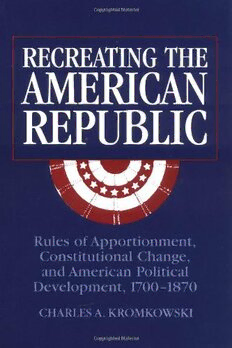
Recreating the American Republic: Rules of Apportionment, Constitutional Change, and American Political Development, 1700-1870 PDF
487 Pages·2002·3.983 MB·English
Most books are stored in the elastic cloud where traffic is expensive. For this reason, we have a limit on daily download.
Preview Recreating the American Republic: Rules of Apportionment, Constitutional Change, and American Political Development, 1700-1870
Description:
Rules of apportionment are vital elements of every social, political, and legal order. In marriages and families, in business partnerships and social organizations, and in governments and supranational relationships, rules of apportionment affect not only how collective decisions are made and by whom, but also how and why a particular constitutional order develops over time. Recreating the American Republic provides a first and far-reaching analysis of when, how, and why these rules change and with what constitutional consequences. Recreating the American Republic reveals the special import of apportionment rules for pluralistic, democratic orders by engaging three critical eras and events of American history: the colonial era and the American Revolution; the early national years and the 1787 Constitutional Convention; and the nineteenth century and the American Civil War. This study revisits and systematically compares each seemingly familiar era and event--revealing new insights about each and a new metanarrative of American political development from 1700 to 1870. Recreating the American Republic will engage and challenge scholars and students of American history; political scientists and sociologists working within the analytical narrative, comparative, and historical-institutionalist methodological traditions; and political and legal theorists intrigued by questions of history, human order, consensual constitutionalism, the agency-structure antinomy, institutional change and representative governance.
See more
The list of books you might like
Most books are stored in the elastic cloud where traffic is expensive. For this reason, we have a limit on daily download.
